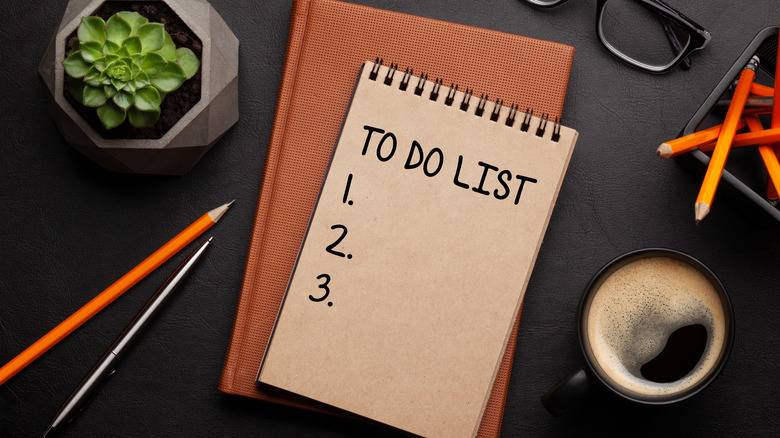Always Running Late? Here's How To Break The Habit
Are you always running behind schedule or showing up late to work meetings? You're not alone. Some people are perpetually late despite waking up early and doing all the right things in the right order. As you might have guessed, this behavior is often perceived as rude, unprofessional, or chaotic. Not to mention that you may feel ashamed or embarrassed for making others wait.
Researchers can't explain this behavioral problem, but several theories exist. For example, some individuals underestimate the time needed to complete a task by up to 40%. Chronic lateness is also more common among Type B personalities and people with memory problems, depression, or other mental illnesses. Anxiety and stress may play a role, too. "Once someone's fight or flight response is activated, they may find it difficult to concentrate on a particular task, consequently resulting in that person being late," said Lucie Ironman, a psychological well-being facilitator, in an interview with Metro.
Sometimes this behavior goes hand in hand with neurodiversity. As psychotherapist Somia Zaman told Metro, "Often neurodiverse people — who are autistic or have ADHD — find time management especially tricky." She also explains that many latecomers cram too much into their days, so they're always behind schedule. On the positive side, it's never too late to stop being late (pun intended!) and get more organized.
Set your watch a few minutes ahead
Old habits die hard, but sometimes it's the little things that make the difference. For example, you could set your watch 10 to 15 minutes ahead to increase your odds of being on time. Go one step further and do the same with your alarm clock. This strategy will not only keep you from being late to meetings but also help reset your sleep schedule.
On a similar note, keep an analog clock at home, in your office, or wherever you spend your day. With this approach, it's hard to lose track of time and run behind schedule. Set those clocks a few minutes ahead, just like you did with your wristwatch.
Another option is to set your alarm clock 20 to 30 minutes earlier than normal, especially if you're a chronic snoozer. This way, you'll have plenty of time to wake up and do your thing in the morning without feeling rushed.
Plan for unexpected delays
Like it or not, you have no control over your surroundings. The bus could be late, the road could be congested, or your car might not start. You also could receive a call from someone who needs your help, or you might need to make it to the doctor at the last minute. Any of these scenarios can mess up your schedule, causing delays or missed appointments.
One solution is to leave some buffer time between tasks. Let's say you have a doctor's appointment at 2 p.m., and it takes you 25 minutes to get to the hospital. Prepare to leave home an hour ahead so you can handle unexpected delays.
Consider what you must do before getting out the door, such as brushing your teeth, switching purses, or packing lunch. Determine how long it takes to complete these tasks and find ways to save time. For example, try these meal prep hacks to make your life easier and spend fewer hours in the kitchen. Also, take into account the time needed to park your car, buy coffee or snacks, walk from the parking lot to the office, and so on.
Don't spread yourself too thin
Some people overestimate their ability to get things done and have a full plate at any given time. "And if these optimists are also gregarious, chatty types, then their meetings, appointments, coffees, lunches, etc. are even more likely to overrun, guaranteeing they will be late for their next commitment," explained psychotherapist Somia Zaman in an interview with Metro.
We all have the same 24 hours in a day, and our energy is limited. Therefore, we can't expect to do a million things at once without running late, missing deadlines, or losing focus. A better approach is to under-schedule yourself, according to clinical psychologist Josh Klapow. "If possible, examine the degree of [your] tasks, deadlines, [and] requirements that are time-contingent and try to reduce some of them so that you are not overloaded," he told HuffPost.
Let's say you want to create a more mindful morning routine. You wake up early, make a smoothie, go jogging, and then return home for a quick yoga session. Everything goes as planned, so you should be able to make it to work on time. But something happens at the last minute – your child has tummy trouble, you can't find your wallet, or a neighbor comes by to ask for a favor. Given these scenarios, you'd be better off giving yourself some buffer time in the morning and cutting your to-do list in half.
Learn to say no
Lateness isn't always a sign of poor time management. In some cases, this habit stems from good intentions, such as the desire to help others. For example, you can expect to run late to a meeting if you stop by to visit a friend going through a breakup. Sure, that's a nice thing to do, but it's not an emergency. There's nothing wrong with telling your friend that you're in a hurry.
Saying no often triggers feelings of guilt, but it doesn't have to be that way. You can and should set boundaries with your friends and colleagues, stick to your schedule, and put yourself first. By doing so, you'll reclaim your time and have more energy for the things you love. Basically, it's a form of self-care.
Stand firm and refrain from making ambiguous statements like, "It's tough to say" or "Umm, I don't know." Instead, be clear about what you mean by saying, "Unfortunately, I'm not available," "I have another commitment," or something along these lines. Remember that you don't owe any explanation, and there's no need to excuse yourself. Be kind and respectful, but firm.
Set artificial deadlines
Another piece of advice comes from Audrey Arbeeny, the creative director at Audiobrain. "If the deadline is Thursday, I say it's Tuesday. The entire team goes into a high red zone and pushes to finish. This gives us time to review and make modifications," she told Forbes. You can use the same approach to stay on track with your schedule and stop being late.
If, say, you have to leave home for a meeting around 10 a.m., tell yourself you must leave by 9:15 or 9:30 a.m. Meanwhile, learn to embrace the waiting or even turn it into a productive force. So, if you arrive 30 minutes earlier at the doctor's office, use that time frame to text your friend back or respond to a work email. You could also plan the rest of your day, make a grocery list, or read a book. These activities will keep boredom from setting in, offering a sense of calm.




